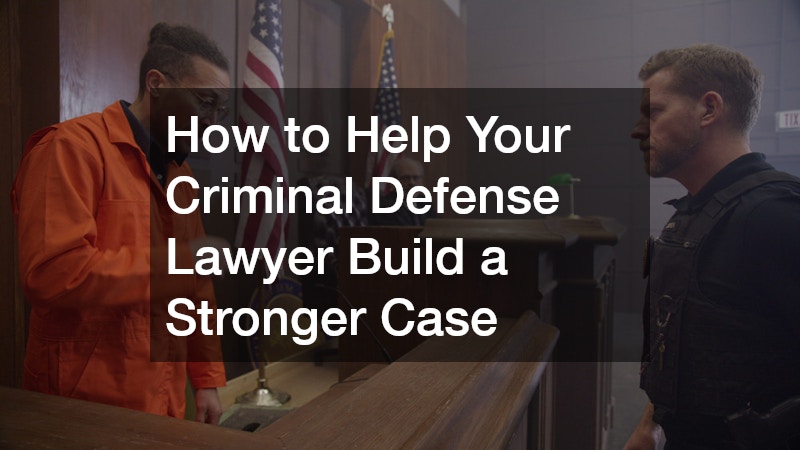How to Help Your Criminal Defense Lawyer Build a Stronger Case

Engaging with a criminal defense lawyer is a crucial step in navigating legal challenges. Knowing how to assist your lawyer can significantly impact the outcome of your case. This article explores strategies you can use to empower your criminal defense attorney effectively.
How Can I Ensure Effective Communication with My Lawyer?
Establishing Open Lines of Communication
Establishing open lines of communication with your lawyer is fundamental to building a trustful partnership. It is important to be transparent and forthcoming with your lawyer so they can fully understand your situation.
This involves promptly responding to all communications from your lawyer, whether calls, emails, or messages. By doing so, you ensure that your lawyer has up-to-date information, which is crucial for making informed decisions.
Maintaining regular check-ins can help both you and your lawyer stay aligned on priorities and developments. This proactive approach also allows you to voice any immediate concerns or updates that could impact your defense strategy.
Preparing for Meetings
Preparing for meetings with your lawyer is key to ensuring these sessions are productive and focused. Start by organizing your thoughts and writing down any questions or issues you wish to discuss.
Documentation is another aspect; having all necessary documents and notes ready will facilitate a smoother dialogue. When you come prepared, your lawyer can better assess your case and provide tailored advice.
Effective preparation helps maximize each session, allowing you to address more points and refine your defense strategy. Taking these steps demonstrates your commitment to working alongside your counsel effectively.
What Information Should I Provide to My Defense Lawyer?
Gathering Essential Documents
Gathering all necessary documents is an essential step in aiding your lawyer’s preparation for the case. You should provide them with police reports, correspondence, and any prior legal records that might be relevant.
This comprehensive package of information allows your defense team to accurately assess your situation and pivot strategies as needed. Proper documentation is vital for mounting a robust defense, often serving as foundational evidence.
Keeping these documents well-organized and readily accessible will streamline the preparation process. Such due diligence on your part ensures that your lawyer can move forward efficiently.
Understanding Case Facts
Understanding and sharing the facts of your case with clarity is fundamental to building a strong defense. You should prepare a clear narrative of events, supplemented by any notes or evidence that support your perspective.
Accurate and truthful details can shape the strategy your lawyer develops, making it essential that nothing is left unexplained. This honesty also builds trust between you and your lawyer, an integral part of an effective defense.
The more coherent and detailed your account, the better equipped your lawyer will be to challenge prosecution narratives. It is critical that you and your lawyer are aligned in your understanding of the case facts.
How Do I Manage Witnesses and Evidence?
Identifying Potential Witnesses
Identifying potential witnesses is a critical component when working with your lawyer to build your defense. Compile a list of individuals who can testify on your behalf, or who have relevant observations concerning your case.
Your lawyer can evaluate whether these witnesses will strengthen your defense and decide how best to integrate their testimonies. Detailing how each witness supports different aspects of your narrative can provide strategic depth.
Having this information enables your lawyer to perform thorough interviews, ensuring that witness testimony aligns well with the case strategy. Strategic witness management can be a significant factor in supporting a favorable outcome in court.
Preserving and Documenting Evidence
Preserving and documenting evidence is imperative for supporting your defense. Safeguard any physical evidence that might contribute to your case’s strength, securing it properly from tampering or loss.
Meticulously maintain records of all new developments relevant to your circumstances. This diligence ensures that nothing is overlooked and that your lawyer has all the tools necessary for your defense strategy.
The fact that even seemingly minor evidence can sometimes prove crucial underlines the importance of careful documentation. Proactive evidence management increases the prospects of mounting a robust and compelling defense.
What Role Do I Play During Court Proceedings?
Understanding Courtroom Protocol
Understanding courtroom protocol is crucial for making a positive impression during court proceedings. Familiarize yourself with the expected behavior, dress code, and procedural norms of the courtroom.
Your presence and demeanor can influence perceptions, so maintaining decorum is essential. Demonstrating respect for the court and its processes reflects well on your character and by extension, your defense.
Observing courtroom rules also prevents unnecessary complications, which could detract from your case. Remaining composed and respectful helps ensure that the focus remains on the substantive merits of your defense.
Responding to Directions from Counsel
Following your lawyer’s guidance during court proceedings ensures cohesive representation. Your lawyer will provide you with specific instructions on how to act and respond in court, which you should adhere to closely.
Compliance with these directions is crucial for maintaining a unified defense strategy. Deviation from advice given by your lawyer can potentially weaken your case or create misunderstandings during the trial.
Your cooperation maximizes the effectiveness of your lawyer’s advocacy on your behalf. This collaboration ultimately contributes to building a strong case focused on achieving the most favorable outcome possible.
While your legal team advocates on your behalf, your active participation and cooperation are invaluable. By effectively aiding your criminal defense lawyer, you can contribute to building a more robust case, thus increasing your prospects for a favorable outcome.


